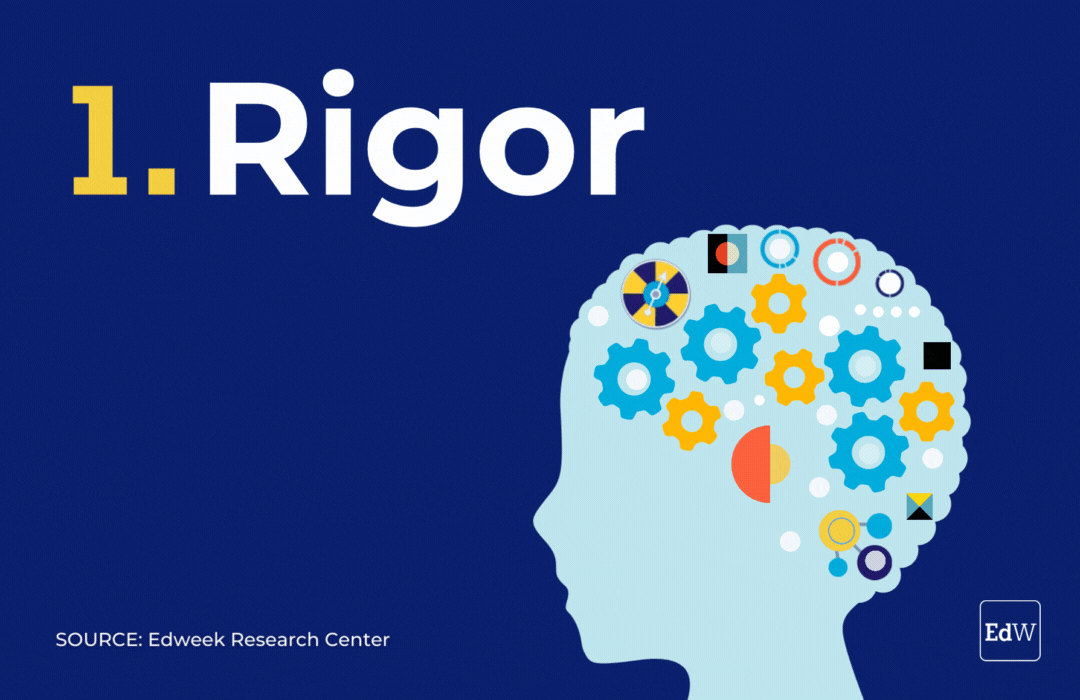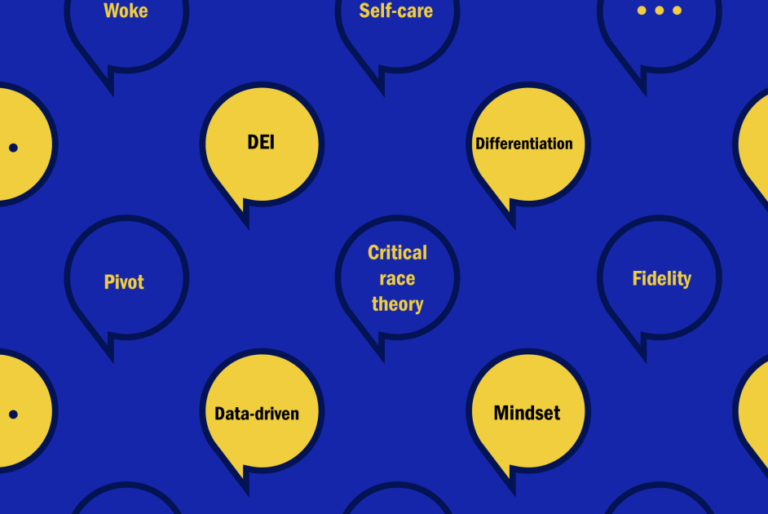If hearing the phrase “faithfully” makes you cringe and want to hide under your desk, then you’re not alone. Fidelity is among educators’ least favorite education buzzwords, according to a nationally representative survey of teachers, principals and district leaders.
Now, we know we’re not the first to round up the most hated educational buzzwords and jargon, but this time we’re bringing some “rigor” (another unpopular buzzword) to the process.
The EdWeek Research Center surveyed educators across the country. Instead of being given a list of predetermined words to rank, teachers, principals and district leaders were asked to share their least favorite education-related buzzwords in an open-ended question. From there, the EdWeek Research Center gleaned more than 200 unique buzzwords and ranked them based on how many educators mentioned each word or concept in their response.
The educators did not hold back.
“Education is always making up terms for things that have long-standing terms in other fields,” said one survey respondent.
“All the damn acronyms the powers that be throw at us in an attempt to mask old things being born again,” said another.
“Buzzwords insult everyone’s intelligence,” said a third respondent.
Taken together, these buzzwords provide insight into major themes in American education in 2023. Social-emotional learning, for example, ranks high among educators’ least favorite buzzwords, while critical race theory, a term that has animated many political campaigns. and tense board meetings in recent years – barely made the top 20.
So, without further ado, here we present the EdWeek Research Center’s findings in the definitive list of 10 education buzzwords of 2023 that educators are tired of hearing.

This buzzword needs no introduction or description. And while, yes, the COVID-19 pandemic has reorganized American schooling, the effects of which are still being felt today, educators are ready to abandon any buzzword containing “COVID.”

Woke – a term often used to refer to awareness of societal issues like racial justice – has been around for a while. Recently, it has taken a pejorative turn when used by conservative politicians (Florida Governor Ron DeSantis, for example) describing or decrying what they view as progressive liberal curricula, such as teaching about racism in schools.

In this context, fidelity is the extent to which a curriculum or program is followed or implemented according to the way it was designed. Sometimes called the “F” word in educational jargon, fidelity is often used with the words “implemented with” and described as the secret sauce to successfully implementing virtually anything. Teachers, in particular, bristle at the expression that they disagree with a program’s teaching methods, or that they consider its scope and timetable to be unrealistic.

The term came into vogue in the 2000s, when annual test score data from the No Child Left Behind Act flooded classrooms and launched a new era of measuring and analyzing scores. It’s only grown: we’re in the age of Big Data, thanks in large part to the growing use of technology in classrooms, and it’s accelerating everything from teaching to decision-making .

An oldie but a goodie! Much ink has been spilled over the years about the pros and cons of standardized testing and their impact on schools – particularly the “high-stakes” variety used for accountability purposes. Whether it is the parents’ opt-out movement of 2015 or the more recent effort of some states will reinvent standardized tests once a yearthe subject is a pillar of educational discourse.

Differentiated instruction is “the process of identifying students’ individual learning strengths, needs, and interests and adapting lessons to match them.” according to this introduction to Education Week on the subject. This sounds good in theory, but some educators see things differently.
One survey respondent said, “Just admit that you expect us to be both (special education), (gifted and talented), and “mainstream” teachers!

Equity appears in almost every educational issue and debate, from school funding to whether history curricula represent the experiences and viewpoints of all Americans. No survey respondent explained why equity was their least favorite buzzword, but we can make a good guess: People have very different ideas about what a school system looks like fair and on the levers to pull to achieve this.
Here’s what one commenter on Linkedin said when the Education Week social media team asked teachers this question last year:
“Equity. It sounds good, but I don’t think people are really committed to achieving it.

Another pandemic-era word to enter the nomenclature of K-12 education. Many students fell behind in academic performance during the pandemic and struggled to catch up, a problem often referred to as learning loss.
The term fell out of favor fairly quickly with some educators, who found it too deficit-focused and not recognizing other skills students might have learned during the pandemic, such as resilience and flexibility. Still others want to be forward-looking, without focusing too much on a single, limited period in the past.

There have been intense interest over the past two years in social-emotional learning, both as a way to help support students, particularly when it comes to behavioral issues and general mental wellbeing. But the term is increasingly politicized, with conservatives arguing that SEL is an attempt to promote liberal values in schools.
Between these two points of view, SEL comes up a lot lately, which probably explains the weariness of some teachers with this term. Not to mention that some of its fundamental principles have been deployed in schools of previous eras under other names: “character education”, anyone?
Said a commenter on LinkedIn: “SALT—we were doing it before it was a thing.”
” SALT ? I have no problem with it, but it bothers me when other people roll their eyes when they hear it,” said one person interviewed in the EdWeek Reasearch Center survey.

According to our survey, rigor is educators’ least favorite buzzword of 2023 and has been part of the educational lexicon for a long time now. But with the high expectations and demanding academic work that make up the concept of rigor, the word has been thrown around a lot lately with the push to catch students up academically after the pandemic. Teachers weighed in on Facebook why they don’t like the term “rigor”:
“I loved that word until it became overused and reused to create vague and unnecessary pressure on teachers,” one said.
Another said: “The idea that we should lead children into higher-order thinking – and resist the all-too-common “soft racism of low expectations” – excited me at first. Why does every good idea end up being used as a deaf stick against teachers?
As a bonus, here are the following 10 least favorite buzzwords:
11. Data
12. PLC (Professional Learning Community)
13. Restorative/restorative justice
14. Take care of yourself
15. Growth Mindset
16. Pivot
17. Testing
18. Critical Race Theory
19. Inclusion
20. DEI
And to the four educators who cited “unprecedented” as the most underappreciated buzzword in education: Your word didn’t make the top 20, but we just want to say we hear you.
